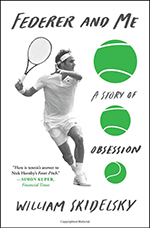My Federer Obsession:
Part 4
William Skidelsky

Did I choose to become a Federer fan, or was the process involuntary? Although it's more romantic to depict myself as having no real say in the matter, there was a time, early on, when I think things could have gone either way.
In this regard, becoming a fan is like falling in love. Before the headlong plunge, there's often a period of indeterminacy, when the outlines of the thing you're feeling--this new fascination--remain unclear. At this stage, you're still a free agent.
You can draw back or push on, cling to your independence or submit. Opt for the latter, and you'll soon relinquish all decision-making capability, but until that happens, a degree of agency is involved.
For the first year or so after my Shanghai revelation (Click Here), this was how things were with Federer. I'd been enchanted, bewitched by his brilliance, but I hadn't yet been utterly ensnared. My affection still had an unlodged quality. One indication of this is that I didn't yet feel the need to watch every one of his matches.
Lacking satellite TV (though I'd acquire it soon enough) and the ability to stream his matches (did live streaming even exist in those days?), my Federer viewing remained fitful, opportunistic.
For him, 2007 was a year of transition. He entered it in one phase of his career and left it in another. Total supremacy gave way not to decline exactly, but to something less other-worldly. Federer's truly great years--when his tennis really did seem flawless--were 2004-2006.

During those seasons, he played a total of 262 matches and lost just fifteen, a win-loss ratio of more than 94 percent. He won thirty-four tournaments and eight Grand Slams. Dominance on this scale, even in a single season, is exceptionally rare in men's tennis. For it to have happened three years in a row was unprecedented.
By any normal standards, 2007 was also extremely good. Overall, Federer won 88.3 percent of his matches and claimed eight titles. He reached the finals of all four Grand Slams, winning three.
At the Australian Open he didn't lose a single set. (The previous male player to win a Grand Slam without dropping a set had been Bjorn Borg, in 1980). He capped the year by winning the Tennis Masters Cup.
But there is a counterargument to the view that this was a remarkable achievement, which is that the competition during this period wasn't particularly fierce. Nadal was still very young; Djokovic and Murray were barely on the scene.
Federer's main rivals were the likes of Hewitt, Safin, and an ageing Agassi. All this is true, but it's not as if those players were walkovers, and in any case, the apparent feebleness of the field is largely a product of viewing it from the perspective of the current era, when the men's game is exceptionally strong.

Most epochs don't have a "big four"; many don't even have a "big two." There were also more losses than usual, including a few unfathomable ones: twice, in consecutive tournaments in the spring, he was beaten by the little-known Argentinian Guillermo Canas.
Then, on the clay in Rome, he lost to Filippo Volandri, an Italian ranked fifty-three in the world. Were these the first signs that his stranglehold was slipping?
The match I have the clearest memory of that year, unsurprisingly, is the Wimbledon final--his second in succession against Nadal. In 2006, Federer won in four sets; this time it went to five. The match, I now realize, was another milestone in my fanship. It was the first time I remember seriously caring about the outcome. Previously, when I'd watched Federer, the experience had never felt particularly fraught.
I had simply relished the spectacle of his superiority. But this time it was different. Federer appeared vulnerable, genuinely threatened. Halfway through the match I realized how very sad I would be if he lost. This feeling--which I suppose was a sign that I was moving into a new, more invested phase of my fanship--caught me unawares. When he hit that famous inside-in forehand to break Nadal in the final set, I remember rising to my feet and punching the air, and being surprised to find myself acting in such a manner.
The following year, the chinks of vulnerability became more glaring still. Federer's overall performance markedly declined. He won just four titles in 2008, and his win-loss ratio slid to 81.5 per cent, its lowest since 2002 (and the lowest it would be until the annus horribilis of 2013). This was the year, I think, when the phrase "the old Federer" started being used. It was clear that something significant was happening, that the years of plenty were over.

I have memories from this period of regularly seeing Federer's forehand--previously so trusty, so invulnerable--suddenly going off midway through a match. It barely seemed believable.
Physical factors played a part. In March, Federer revealed that he had been diagnosed with glandular fever. He nonetheless went on to reach the Wimbledon final (which he came agonizingly close to winning) and then, in September, won his fifth consecutive US Open, beating Andy Murray in the final. But the statistics were unarguable: his success was diminishing.
That summer, not long after Federer's despair-inducing loss to Nadal at Wimbledon, I moved into a new flat in South London, and treated myself to a Sky TV "multi-room package." (I had a new job at a Sunday paper and, for the first time ever, felt reasonably well off.)
My parents had recently given me a present of a massive flat-screen TV, which they'd found too imposing for their own sitting room. This I now installed in my bedroom. It was perfect: when Federer was playing in far-off places, at inconvenient hours of the night, I could watch him without even having to rise from my bed. Set the alarm, reach for the remote control, and hey presto: there he was!
It's probably not a coincidence that 2008 was the year my obsession ratcheted up a notch and became wholly entrenched within me. For me, this was a period of emotional turmoil.
The girlfriend I'd acquired a few years earlier had ended our relationship in 2007. I took this very hard. Shortly afterwards, I got together with the woman who would become my wife. But not enough time had elapsed since the previous relationship had ended, and I wasn't yet ready for a new one.

I couldn't commit. Throughout 2008 and 2009, I behaved idiotically. My new girlfriend and I split up-and then reunited--several times. I tested her patience to its limits. Looking back, I can see that, during this confused time, Federer functioned as a point of constancy, of stability. It was as if he provided the security I craved but couldn't achieve. There was a comfort in knowing that, throughout the year, he would be playing somewhere, and wherever that was, I could tune in and watch.
And I'm sure it was significant, too, that his career was already in decline, that he was losing his aura of invulnerability. The losses he suffered--and there were some truly crushing ones--produced a pain that resonated within me, and the effect, paradoxically, was oddly consoling.
These years, of course, weren't all bad for Federer. He remained, with Nadal, one of the two best players in the world. And he had some great wins: the 2008 US Open, his first (and only) French Open the following summer and the 2010 Australian Open. Yet glorious as such moments were, it was the losses that seemed significant, that made the biggest mark.
In 2010, my own period of emotional turbulence came to an end. I don't know what exactly caused the change, but I suddenly realized that I was in danger of throwing away the opportunity I had-the best opportunity I ever would have--to make a life with the beautiful, strong, intelligent woman I loved. Just in time, I veered away from the train-wreck course I'd been stuck on. My girlfriend took some convincing that I was, serious, but eventually I managed to persuade her. I'm so grateful that this happened, and for how everything has turned out.





